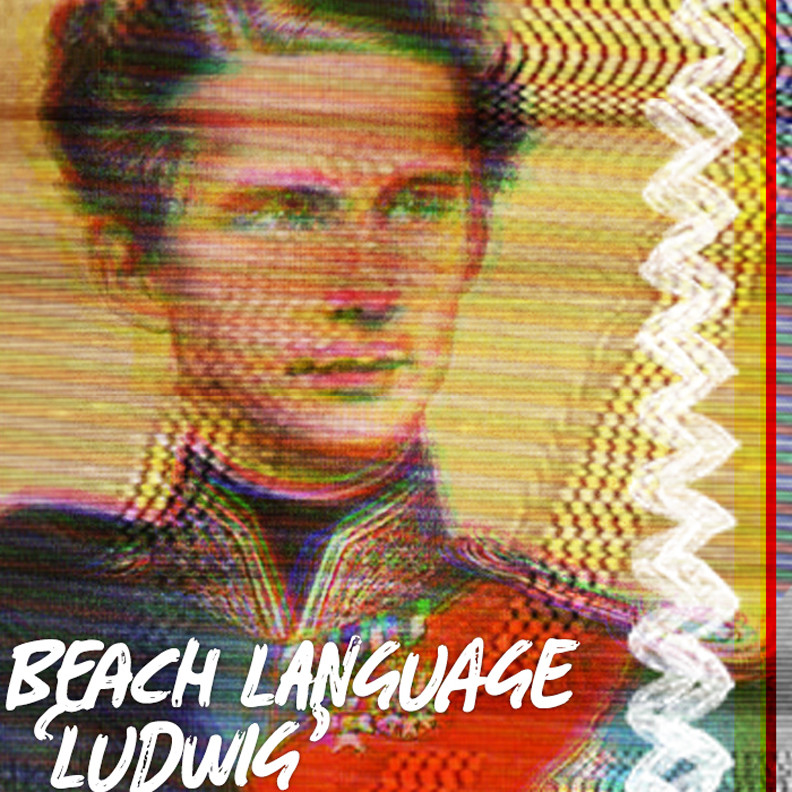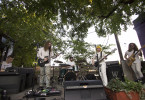Beach Language with Us Lights and Feel Spectres
Sunday, March 22
Blue Note Lounge | Oklahoma City
It’s a liberating era we live in, one where the execution of an entire album — writing, performing, recording, artwork, distribution — can be exacted independently of anyone else’s help. That’s precisely the route Adam LeNaire took in prepping his debut EP, Ludwig, as Beach Language, an upstart Oklahoma City project championing naive romanticism and sweet wistfulness in the form of glitzy, synth-driven ’80s pop à la Italians Do It Better (Chromatics, Glass Candy) and tender, sad-sack ’00s indie-pop hooks.
But there are certain limitations to going solo, and this charming little listen — out since July — is just now receiving its proper due, thanks to finding a crew to help recreate these songs in a live setting: Bassist Nick Culp, keyboardist Avery Oden and drummer Josh Robinson. They’ve been playing a flurry of shows since late February, including this Sunday’s show at Blue Note Lounge, and Oxford Karma talked to LeNaire about learning to rely on others, being carried around by nude dudes and the desire to be remembered.
Oxford Karma: You did all the songwriting and recording yourself on the Ludwig EP you put out last summer. Now you have bandmates to help recreate those songs in a live setting, but do you see yourself writing with them in the future or do you plan on keeping it primarily something you do on your own?
Adam LeNaire: Yes, absolutely. Getting to a point where I could start writing with others was always a big goal for Beach Language. Doing it myself was an interesting challenge, but I really felt the lack of collaboration that is such a big part of what makes music fun. After I made the EP, I starting asking people if they’d be interested in playing it out and moving forward with more songs. It wasn’t too long before I met up with the guys, and everything clicked from the get go. I’m really excited to see what comes out of all our heads.
OK: What benefits do you see to writing primarily by yourself? What do you miss about working with other people?
LeNaire: Writing by yourself is pretty cool because you can set up the bones of a song in front of you and from out of nowhere you find the rest of the pieces to make a song. The downside of that is you know where the pieces come from. You can’t — or at least I can’t — help but think, “Yeah that part fits. But is it really the best part that could be there?” When you work with others you get to watch someone else pull a fantastic element out of thin air, and you get to play the part of the listener and be blown away at some cool hook or something.
OK: You’ve been able to be more active playing shows now that you’ve got those guys there to assist you live. How have you enjoyed introducing people to these songs in a live setting? How are crowds reacting?
LeNaire: Yeah, that part has been a little crazy. So far, I’ve heard only positive feedback, which is really humbling … but I guess if someone doesn’t like it they probably wouldn’t come up to you and say, “This really blows, man. Thanks for wasting our time!” I had no real idea how any of this would be received. When I go out to shows to see friends in bands, it’s all guitars and rock and killer riffs, and here we are with a bunch of keys and me playing muted triplets on a single string. It seems like there’s a place for us because people have been really complimentary.
OK: Your EP has been out for over six months now. What about that first batch of songs would you say you are most proud of and most pleased with?
LeNaire: The thing I like the most about the EP as a whole is that it’s the first group of songs I’ve been able to string together coherently. I’ve written a bunch of stuff landing all across the pop-rock spectrum, but these are the first that all fit pretty well together and all fit thematically.
OK: The title Ludwig kind of hints at a bygone era we associate with stiff classical culture. What definition do you hold for it, though? And what made it feel like the appropriate name for this collection of songs?
LeNaire: I was stuck on “Ludwig” (the song) for a long time … like a year or more. I had the structure and the melody all worked out, but I could not for the life of me land on something to write about. My girlfriend Amber kind of jokingly said I should write a song about Ludwig II, the deposed king of Bavaria. Around this same time, my brother wrote up this quote from a Wallace Stevens poem on this whiteboard I have around my house that said, “One man opposing a society. If properly misunderstood becomes a myth. I fear the understanding.”
Then I saw the whole thing just click together. This guy Ludwig was really eccentric. Like imma-build-grottos-in-my-basement-and-be-carried-around-on-a-palanquin-by-muscle-men eccentric. But he said almost the exact same sentiment as Stevens. He said, “I want to remain an eternal mystery to myself and others.”
Here’s this guy who everyone says is crazy and was forcibly removed from power. And his biggest worry? That he would be forgotten, that no one would remember who he was or that he ever existed. That became the central theme to all the songs; loneliness, the fear of being forgotten, loss — that’s what ended up being the jumping-off point for the whole thing. So the rest of the songs are about different people and places in different times, but all connected by the same ideas. Since Ludwig II was the impetus for all that I figured he earned the title spot.
OK: It’s very much a synth-and-guitar indie-pop sound at the very core of it all. Who are some of the artists you find yourself drawn to for inspiration in that regard?
LeNaire: I had quite a little pool of references when I would hit a wall. I would listen to Kill for Love and Night Drive by Chromatics, Taki 183 by Dye as well as anything by STRFKR and Metric. There’s this little project band out of South Africa called Gateway Drugs that is just insanely catchy, and Rio by Duran Duran is probably peppered in there somewhere. Also, the song “Goodbye Horses” by Q Lazzarus is just so perfect. I have to mention that.
OK: Is a great hook the component you are most compelled to achieve as an artist?
LeNaire: I don’t think I really sit down looking for a hook exactly. Not like I imagine guys like Dr. Luke does or Phil Spector did. What I try to shoot for is variety and simplicity. So things like getting the most out of a chord progression, or changing the underlying structure under a consistent melody. As far as what makes a song successful to me, it’s probably if I still want to listen to it after a week.
OK: I understand that you have more songs written and on the way in the near-ish future. How do these new songs — be it in terms of musical character, mood, quality or otherwise — compare to what we hear on Ludwig?
LeNaire: New stuff is on the way. Character-wise, it’s got more guitars going on and a bit more drive. I’m not really sticking to theme for these yet, but I tend to write lyrically sad songs and I’m pretty sure that won’t change a lot for the foreseeable future.
OK: What sort of future do you see for Beach Language moving forward, now that you have an established lineup to play with? And how do you hope to see the project evolve, creatively, in the future?
LeNaire: It’s exactly that lineup (Culp, Robinson and Oden) that I hope is the big evolution for Beach Language. So I expect more ideas, more collaboration, and hopefully great songs that are fun to play and to listen to.
_
Beach Language performs Sunday night at Blue Note Lounge with Portland indie-rock band Us Lights and Feel Spectres. The show starts at 9 p.m. Cover is $5.





